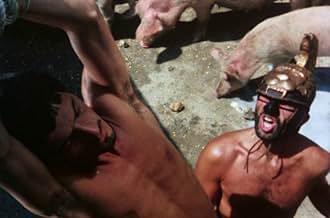Reassigned to a lowly outpost, a Roman guard's Christian beliefs clash with his gay commander's desire for closeness. Being tortured becomes pleasurable.Reassigned to a lowly outpost, a Roman guard's Christian beliefs clash with his gay commander's desire for closeness. Being tortured becomes pleasurable.Reassigned to a lowly outpost, a Roman guard's Christian beliefs clash with his gay commander's desire for closeness. Being tortured becomes pleasurable.
- Awards
- 1 nomination total
- Sebastian
- (as Leonard Treviglio)
- Emperor's Guest
- (uncredited)
- Emperor's Guest
- (uncredited)
- Emperor's Guest
- (uncredited)
- Emperor's Guest
- (uncredited)
- Emperor's Guest
- (uncredited)
- Emperor's Guest
- (uncredited)
- Emperor's Guest
- (uncredited)
Featured reviews
Sebastiane, a Christian, is exiled to a remote sort of military camp. The emphasis as has been said is clearly on the visual.The air permeates and oozes of sexual desire and longing. Soldiers are half naked throughout, often wrestling, joking, and talking a lot about sex. Sebastiane, stands apart because of his Christian beliefs, and the film explores the sado masochism inherent in martyrdom, the pleasure the pain brings, further strengthening his convictions. Sebastiane believes strongly in a higher power and the film itself seems em bused with a spirituality in its slow contemplative shots of nature. The film also deals heavily with unrequited love, both Justin and Severes have an eye for Sebastiane but express it in very different ways. There is also a gay couple among the soldiers whose love is tender and natural. Jarman has a distinct "voice", his films and imagery feel deeply personal and are generally in my opinion fascinating to watch.
Consider the film's approach to homosexuality. No one is defined as being a homosexual, so that at first seems like a de-politicization of sex -- all there are are acts, and acts are not political. But at the same time, it's acts that are disdained and made illegal, and without the "political" approach to defining (and thereby defending) people as homosexuals, it leaves the acts open to censorship and condemnation -- politicization. As a film itself, though, it is not pedantic or accusatory -- in fact, Sebastian is killed, it seems, because of the lust of Severus, who he refuses. Like the Christian God who Sebastian loves and sees as more beautiful than Adonis, Severus wants Sebastian. But it isn't just condemning lust, either -- Anthony and Adrian are openly lovers, and the abundance of male nudity, and the eroticism of it by Jarman, could hardly be called prudish. In fact, there is a scene at night of the men grabbing each other, their dark-lit bodies, and the soldier pressing his near-naked, muscled body on his lover, that still seems shocking in its passion today.
It's more like a lyrical tone poem, and Brian Eno's New Age-y score goes well with that. Jarman isn't a bully, and when the crucifying comes around he doesn't bludgeon us -- first we see a close-up of his face, as arrows pierce through Sebastian's skin, silently with the exception of the wind, and Jarman gives us one final distorted image to meditate on the death of the one we can't have. 9/10
Looking back on the film from more than a quarter of a century, it seems clear that normal criteria concerning story, dialog, and character simply don't apply here. Instead, one must simply view it as a feverish, almost hallucinogenic fantasy drenched with homoerotic, sadomasochistic imagery that is played out against a sun-drenched dreamscape on the Sardinian coast. Think of it as a high-class photo shoot for an avant-garde fashion magazine specializing in loincloths and Roman military paraphernalia.
Having the dialog spoken in Latin can be dismissed as a "gimmick" but actually it adds to the film's air of mystery and unreality. If only some of the anachronisms could have been avoided!
Considering the possibilities, there's surprisingly little sex here, though it's a subject often discussed and, indeed, the whole film is imbued with an air of desire and yearning. On the other hand, there's a plethora of bondage and torture. Leonardo Treviglio, who plays the title character and who spends most of the movie in no more than a loincloth, is hanged by his wrists and flogged, burned with a flame, staked out spreadeagle-style under the scorching sun, and finally shot full of arrows. Curiously, his most memorable torment is also the simplest. Barney James, playing the commanding officer who's torn by conflicting emotions, takes a handful of sand and grinds it into Treviglio's bare torso, blurring the lines between pleasure and pain, between lust and longing. It's a memorable moment in a movie that is now half-forgotten ... like one of those dreams which fade from the mind after you awaken, even though you try to recall the details.
Did you know
- TriviaWhen asked about the film's nudity, director Derek Jarman replied "We couldn't afford costumes."
- GoofsThe soldiers play with a modern Frisbee in one scene. When one soldier catches it, the logo appears.
- Quotes
Sebastian: His eyes are so beautiful. He has sky-blue eyes.
Justin: What is this? What are you talking about?
Sebastian: His hair is like the sun's rays.
Justin: Sebastian...
Sebastian: His body is golden like molten gold. This hand of his... will smooth away these wounds. Justin, he is as beautiful as the sun. This sun which caresses me... is his burning desire. He is Phoebus Apollo. The sun... is his... burning kiss.
- Alternate versionsWhen shown on British television in the 1980s, a shot of a naked man with the erection was cut out of the film.
- ConnectionsFeatured in Arena: Derek Jarman - A Portrait (1991)
- How long is Sebastiane?Powered by Alexa
Details
Box office
- Gross worldwide
- $4,091
- Runtime1 hour 26 minutes
- Sound mix
- Aspect ratio
- 1.37 : 1
Contribute to this page
























